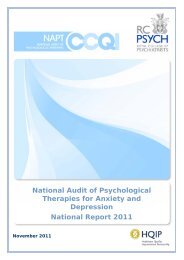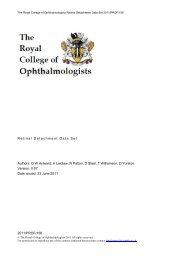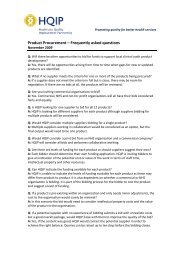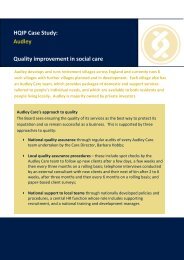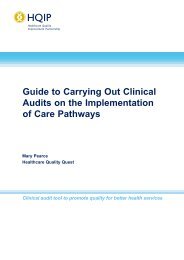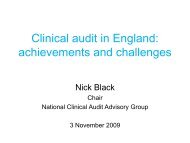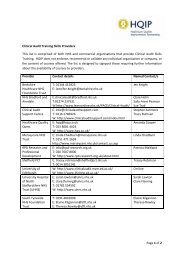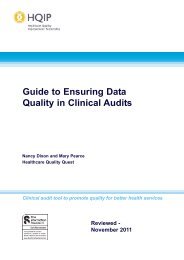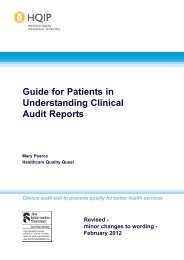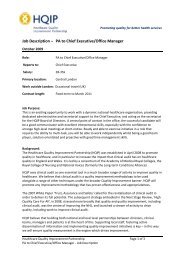Good Governance Handbook - HQIP
Good Governance Handbook - HQIP
Good Governance Handbook - HQIP
You also want an ePaper? Increase the reach of your titles
YUMPU automatically turns print PDFs into web optimized ePapers that Google loves.
4. Principles of <strong>Governance</strong> and why they are important<br />
In this document the following nine foundation principles of good governance are<br />
offered. Each of these reflect Alpa’s 13 premise that principles should be of<br />
fundamental value; understood by users as the essential characteristics of the system<br />
and reflect the system's designed purpose.<br />
These principles will help those boards and those developing governance systems to<br />
decide what is most appropriate for the specific needs of their organisation.<br />
<strong>Governance</strong> principle 1: Entity<br />
An organisation is a discrete entity and a legal personality. Thus the organisation as a<br />
corporate body owes duties of care and needs to observe responsibilities and<br />
compliances that are separate from those of the organisation’s owners or those<br />
controlling the organisation. Often, the organisation will have its own limited liability.<br />
Why it is important<br />
Often governance issues arise when one is uncertain about what the entity is one is<br />
dealing with, such as in a network, across a service continuum or when services are<br />
delivered through a partnership or contract arrangement. It is important to<br />
understand what the entity is and who is accountable, and that the entity concerned<br />
should be legally constituted, aware of its responsibilities and easy to identify.<br />
<strong>Governance</strong> principle 2: Accountability - The ‘controlling mind’<br />
Organisations are run by people, and those who direct the organisation and act as the<br />
organisation’s ‘controlling mind’ need to be readily identifiable to any who might<br />
have dealings with that organisation, in order that all can understand who is<br />
accountable for the control of the organisation and who can enter into engagements<br />
on the organisation’s behalf. Where the organisation has been separated from its<br />
owners (that is, is not a sole trader or a partnership where the principals are singly<br />
and jointly liable for the control of the business entity) and is a body corporate then<br />
those who act as the controlling mind are usually termed ‘directors’. Directors have<br />
responsibilities in law for looking after the interests of the organisation and of all<br />
stakeholders. The balance of how this is executed will change as the organisation<br />
encounters opportunities and challenges. Directors act collectively as a board, this<br />
being the overall accountable group that comprises the ‘controlling mind’.<br />
Why it is important<br />
All legal entities should be controlled by identifiable individuals who can be brought<br />
to account for their actions. Within an organisation, it is important to be able to<br />
distinguish between those who are accountable for the organisation and those who<br />
13 Alpa, Guido "General Principles of Law," Annual Survey of International & Comparative Law: Vol. 1:<br />
Iss. 1, Article 2 1994<br />
www.good-governance.org.uk 9



